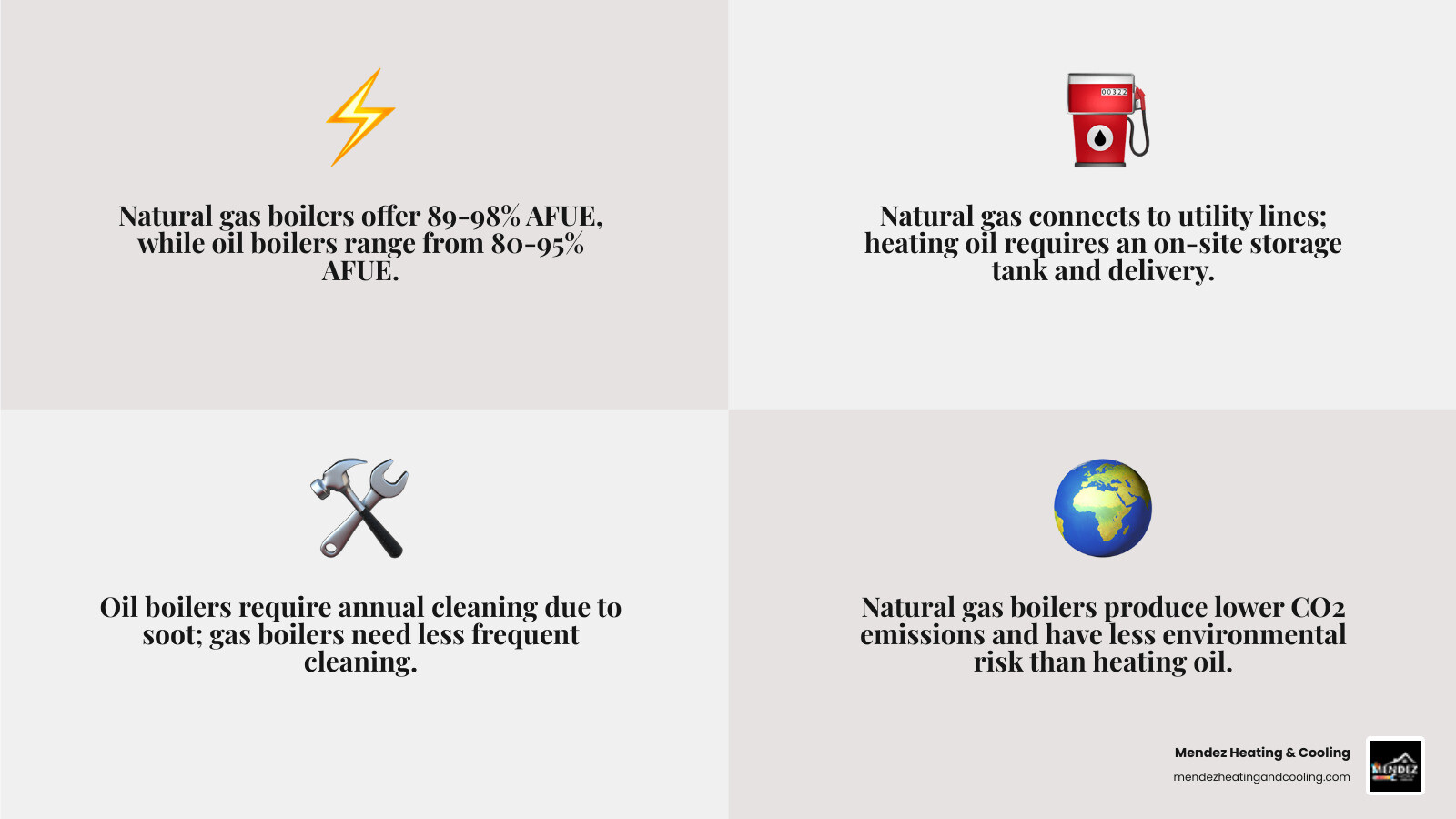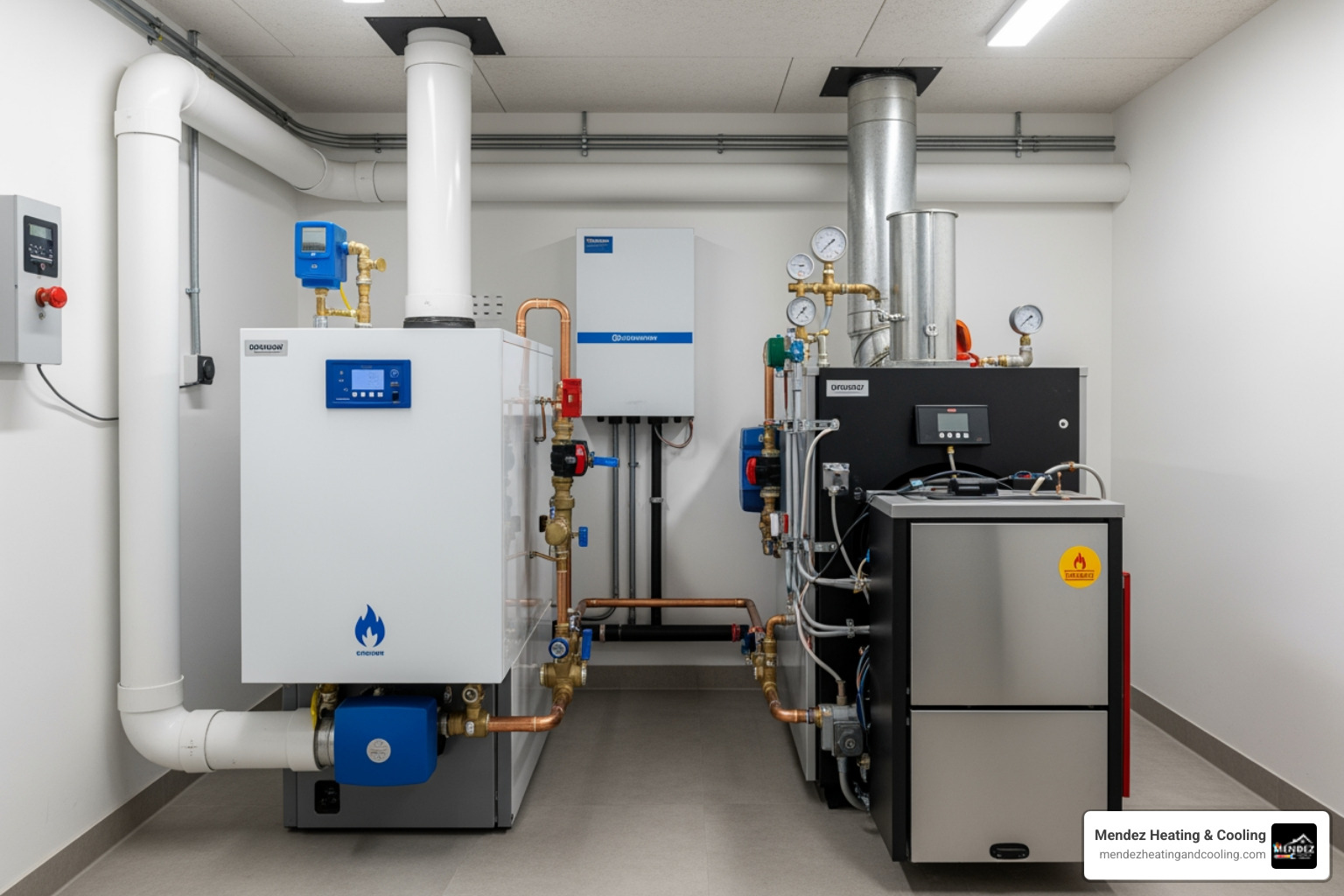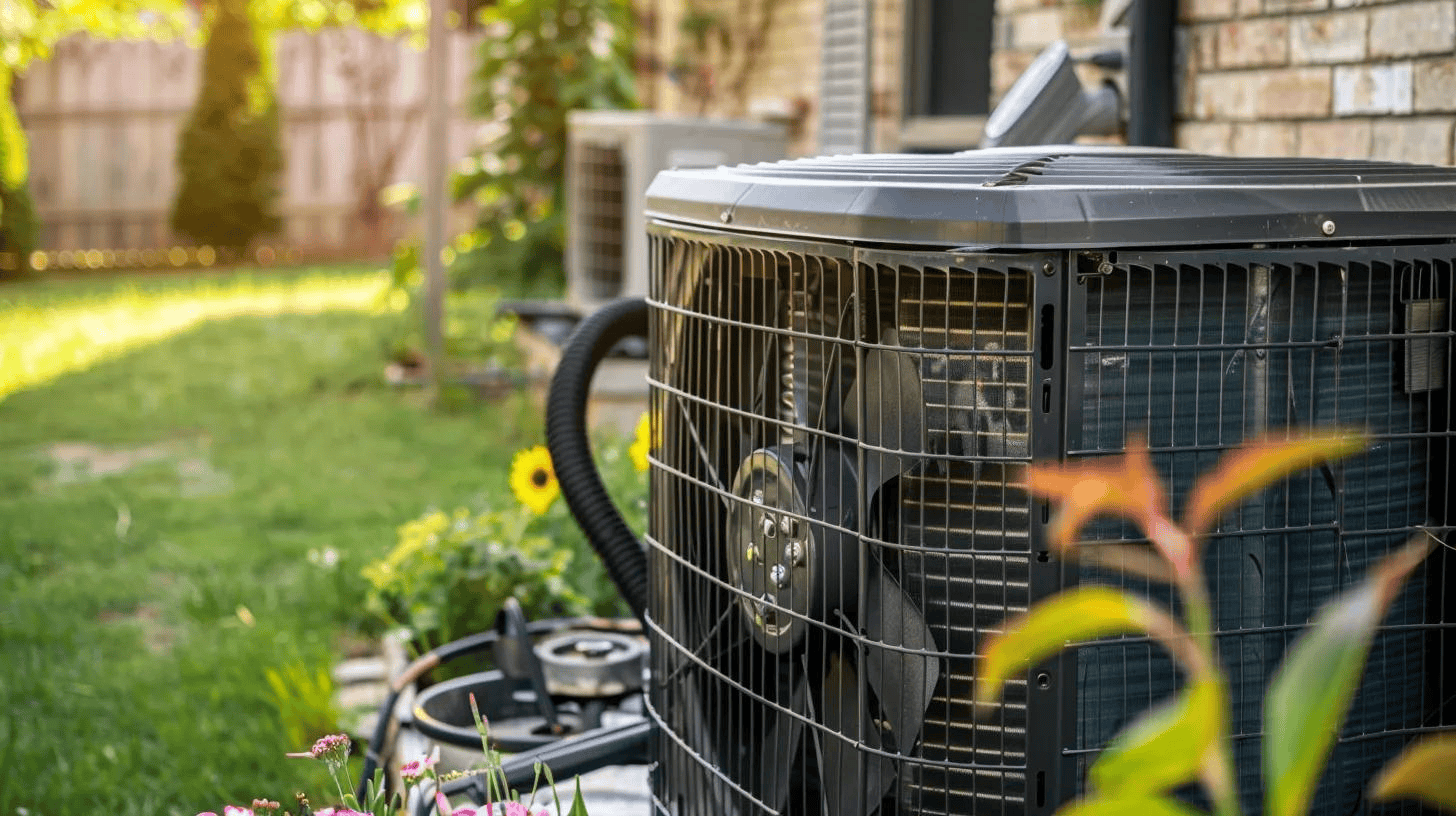Fueling Your Comfort: Making the Gas or Oil Boiler Choice in Easton

Making the Right Heating Choice for Your Easton Home
Choosing between a gas vs oil boiler easton pa is one of the most important decisions you'll make for your home's comfort and your wallet. With Pennsylvania's cold winters, your heating system isn't just a luxury—it's essential. Both gas and oil boilers can keep your home warm, but they differ significantly in efficiency, maintenance, environmental impact, and long-term costs.
Quick Comparison: Gas vs Oil Boilers
| Factor | Natural Gas Boiler | Oil Boiler |
|---|---|---|
| Efficiency (AFUE) | 89-98% | 80-95% |
| Fuel Source | Natural gas line | Delivered oil tank |
| Maintenance | Less frequent cleaning | Annual cleaning required |
| Lifespan | 15-20 years | 15-25+ years |
| Environmental Impact | Lower CO2 emissions | Higher CO2 emissions |
| Installation | Requires gas line access | Needs on-site storage tank |
| Heat Output | Consistent, faster | Higher BTU per gallon |
If you're facing a boiler replacement or installation decision in Easton, understanding these differences will help you choose the system that best fits your home's needs, budget, and future plans. For expert guidance on heating systems, explore our comprehensive heating services, or contact Mendez Heating & Cooling for a professional assessment.

Key Comparison: Gas vs Oil Boiler Easton PA
When deciding on a heating system for your Easton home, the gas vs oil boiler easton pa choice impacts your comfort, bills, maintenance needs, and environmental footprint. Let's compare what matters most between these two options.

At Mendez Heating & Cooling, we've helped countless families steer these decisions with our boiler service in Easton, PA, and we're here to make this choice clearer for you.
Efficiency and Heat Output
Efficiency is crucial as it determines how much fuel actually heats your home versus being wasted.
Natural gas boilers excel in efficiency. Modern systems have AFUE (Annual Fuel Utilization Efficiency) ratings of 89-98%, meaning most of the fuel you buy heats your home. They also provide quick, consistent warmth.
Heating oil offers powerful heat output. A gallon of oil produces about 40% more BTUs (British Thermal Units) than the same amount of natural gas. This means your home heats up faster and stays warm longer, which is ideal for when temperatures drop.
Modern high-efficiency oil boilers can reach AFUE ratings up to 95%, competing with gas systems. Since oil generates more heat per unit, you may use less over time. For both types, efficiency depends on the system's age and maintenance.
Environmental Considerations
Your heating system significantly impacts your environmental footprint. While both natural gas and heating oil are fossil fuels, their environmental effects differ.
Natural gas burns cleaner. It releases about 25% less carbon dioxide than oil, a meaningful difference for reducing your carbon footprint. It also produces almost no soot, resulting in less pollution.
Heating oil has also improved. Ultra-low-sulfur heating oil burns much cleaner than older versions. While it still produces more CO2 and some soot, modern, well-maintained systems are relatively clean-burning.
When it comes to fuel storage safety, there's a trade-off to consider. Heating oil is remarkably safe to store—it won't vaporize until it reaches 140 degrees Fahrenheit, so it won't explode or ignite easily. However, oil tanks (especially older ones) can develop leaks over time, and cleaning up oil contamination in your soil or groundwater is expensive and environmentally damaging.
Natural gas doesn't require on-site storage, which eliminates the tank leak concern entirely. However, gas leaks in your home can pose safety risks, though modern systems include multiple safety features to detect and prevent problems.
Maintenance and Upkeep
The maintenance required for gas and oil boilers differs significantly, impacting long-term costs.
Gas boilers are generally lower-maintenance. Natural gas burns cleanly, leaving little residue. Annual tune-ups are still recommended for safety and efficiency, and regular inspections can prevent issues like low water pressure in gas boiler.
Oil boilers require more attention. Combustion creates soot and residue, necessitating frequent filter changes, burner adjustments, and cleanings for efficiency. Annual tune-ups are essential for oil systems to prevent reduced efficiency, higher fuel use, and costly repairs.
Whether you're in Easton or throughout the Lehigh Valley, our team provides comprehensive boiler maintenance in Reading, PA and beyond. For gas system owners, our specialized gas boiler service in Bethlehem, PA ensures your system performs at its best year after year.
Installation and Long-Term Ownership in Easton
Choosing a gas vs oil boiler easton pa is a long-term commitment affecting your comfort, maintenance, and bills for decades. The installation process differs for each fuel type, and understanding what's involved helps avoid surprises.
At Mendez Heating & Cooling, we've helped countless homeowners in Easton, PA steer these decisions. Whether you need a furnace installation in Easton, PA or a complete boiler replacement, we're here to guide you through every step of the process.
Fuel Availability for Gas vs Oil Boiler Easton PA
First, determine which fuels are available at your home. Many Easton neighborhoods have access to natural gas lines. If your home isn't connected, the process involves excavation and permits. Once connected, you'll have a continuous, convenient fuel supply without needing to schedule deliveries.
Heating oil is delivered to an on-site storage tank, which can be located in your basement, outside, or underground. Pennsylvania has a well-established oil delivery infrastructure, with options for scheduled or automatic deliveries. Oil provides independence from utility infrastructure, which is valuable in rural areas without gas lines. The fuel supply reliability for both options is generally excellent in our area.
System Lifespan and Reliability
A new heating system is a major investment, and both gas and oil boilers are durable choices when properly maintained.
Natural gas boilers typically last 15 to 20 years or more. The clean burn of natural gas causes less wear on internal components, contributing to their durability.
Oil boilers are also long-lasting, often serving for 15 to 25 years or more, with well-maintained systems sometimes exceeding 30 years. Annual maintenance is crucial to achieving this long lifespan.
The key to longevity for either system is consistent, professional maintenance. Regular tune-ups ensure your boiler will be reliable during Easton's cold snaps. When your boiler reaches the end of its service life, our boiler replacement in Allentown, PA services can help you transition smoothly to a new, efficient system.
Installation Considerations
Installation details for gas and oil systems differ significantly, affecting equipment placement and disruption.
Venting requirements differ greatly. Many high-efficiency gas boilers can be vented directly through an exterior wall using PVC pipe. This simplifies installation, especially for homes without a suitable chimney. Traditional oil boilers usually require a chimney for venting. If your home lacks a suitable chimney, this can add complexity to the installation.
Space requirements differ as well. Gas systems need room for the boiler itself. Oil systems need space for both the boiler and a fuel storage tank, which requires planning for placement and delivery access.
The gas line connection process can be a significant hurdle if you're installing gas for the first time, involving excavation, permits, and coordination with the utility company. Conversely, switching from oil to gas requires professional oil tank removal to comply with environmental regulations.
Working with an experienced HVAC company in Easton, PA ensures that all these installation considerations are handled properly, safely, and efficiently. At Mendez Heating & Cooling, we know what it takes to get your new boiler up and running smoothly.
Future-Proofing Your Home's Heating
When you're investing in a new boiler, it's smart to think beyond just staying warm this winter. How will your choice affect your home five, ten, or even twenty years from now? The right boiler can open doors to modern heating technology and home upgrades you might not even be considering yet.

From smart thermostat integration to advanced heating distribution, our furnace service in Easton, PA ensures your system is ready for whatever comes next.
Compatibility with Radiant Heat and Other Upgrades
Here's some good news: both gas and oil boilers work beautifully with hydronic heating systems. If you've ever dreamed of having radiant in-floor heating—that luxurious, even warmth that makes cold bathroom tiles a thing of the past—either fuel type can make it happen.
Oil-fired boilers are particularly well-suited for these applications. Their robust heat output makes them ideal for powering not just in-floor radiant heating, but also snow melt systems for your driveway and sidewalks. Imagine never shoveling again after a Pennsylvania snowstorm. Both gas and oil systems can handle these hydronic applications with ease, giving you the flexibility to upgrade your comfort as your needs and budget allow.
Beyond keeping your floors toasty, both boiler types can integrate seamlessly with your home's hot water needs. Many modern boilers pull double duty, providing both space heating and an endless supply of hot water for showers, laundry, and dishes. Gas systems offer additional versatility here—they can be paired with tankless water heaters that provide hot water on demand without the space requirements of a storage tank.
The beauty of choosing the right boiler now is that it becomes the foundation for these future comfort upgrades. Whether you're planning to add radiant heat to a bathroom remodel or dreaming of a whole-house heated floor system, your boiler choice today can support those goals tomorrow.
Long-Term Ownership: Gas vs Oil Boiler Easton PA
Choosing between a gas vs oil boiler easton pa isn't just about today's heating bills—it's about how this decision will affect your home for years to come. Let's talk about what long-term ownership really looks like with each option.
Fuel price stability is one area where natural gas typically shines. Gas prices tend to be more predictable and less volatile than heating oil, which can swing dramatically based on international market conditions. When you're planning your household budget, knowing your heating costs won't suddenly spike is a real comfort. Oil prices, while sometimes lower, can be harder to predict from season to season.
The impact on resale value is worth considering, especially if you might sell your home down the road. Many homebuyers view natural gas as a desirable feature, and homes with gas heating often sell faster than those relying on oil. It's seen as modern, efficient, and convenient—all qualities that appeal to buyers.
When it comes to future system upgrades, natural gas offers impressive versatility. Once you have that gas line running to your home, it opens up possibilities beyond just heating. You can add a gas water heater, upgrade to a gas range for cooking, install a gas fireplace, or even switch to a gas dryer. It's like having multiple upgrade paths available from a single utility connection.
Energy independence looks different depending on which fuel you choose. With oil, you're not dependent on utility companies or gas lines, which gives you a certain freedom. However, you'll need to monitor your tank levels and schedule deliveries, especially before cold snaps. Natural gas provides a continuous supply that flows automatically—no monitoring, no delivery trucks, no running low at the worst possible time.
The versatility for other home appliances is another long-term consideration. Natural gas can power a wider range of household systems beyond your heating. From cooking to drying clothes to heating water, gas can centralize your home's energy needs in a way that oil simply can't match.
These factors all add up to shape your experience as a homeowner. There's no universally "right" answer—what matters most is which set of advantages aligns best with your home, your lifestyle, and your plans for the future. At Mendez Heating & Cooling, we help Easton homeowners think through these long-term considerations so you can make the choice that truly serves your family best.
Frequently Asked Questions about Gas and Oil Boilers
We understand that choosing between a gas vs oil boiler easton pa comes with many questions. After years of helping homeowners in Easton and throughout the Lehigh Valley, we've heard just about every concern and curiosity. Here are the answers to the questions we hear most often, straight from our experience in the field.
Which fuel is considered safer to store at home?
Safety is always a top concern when it comes to heating your home, and it's one of the first questions we hear from families making this decision.
Heating oil has some inherent safety advantages when it comes to storage. It has a vaporization temperature of 140 degrees Fahrenheit, which is relatively high. This means heating oil won't ignite in its liquid state and requires significant heat before it becomes combustible. If a leak occurs, the oil tends to pool rather than creating an explosive vapor cloud. When your system is operating correctly, heating oil doesn't produce carbon monoxide during combustion, though this depends on proper maintenance.
Natural gas, while exceptionally clean-burning, is a combustible gas that can pose risks if leaks occur in your home. A gas leak can create an explosive hazard if not detected quickly. That said, modern natural gas systems include multiple safety features, and utility companies add a distinctive odor to natural gas specifically to help you detect leaks. Well-maintained natural gas heaters are unlikely to emit carbon monoxide, but unserviced systems can develop problems that lead to dangerous buildup.
Regardless of which fuel type you choose, carbon monoxide detectors are absolutely essential for any combustion heating system. These devices can save lives by alerting you to problems before they become dangerous. Regular professional servicing is vital for both gas and oil systems—it ensures safety, maintains efficiency, and extends the life of your equipment. If you're experiencing any concerns with your gas system, our team is here to help with expert gas furnace repair in Easton, PA.
Can my existing boiler be converted from one fuel to another?
This is a question we get quite often, especially from homeowners who are interested in switching to natural gas but already have an oil system in place.
The short answer is yes—in many cases, an existing oil boiler can be converted to run on natural gas. The process typically involves replacing the oil burner with a gas burner, though sometimes it makes more sense to replace the entire boiler unit, particularly if your current system is older or showing signs of wear.
Oil to gas conversion is the most common direction for these projects. Beyond swapping the burner or boiler itself, you'll need a natural gas line installed to your home if you don't already have one connected. You'll also need to safely remove and dispose of your old oil storage tank, which is an important environmental consideration. Some older underground tanks can be particularly tricky and require specialized removal.
Converting from gas to oil is technically possible but far less common, since most homeowners prefer to move toward natural gas when it's available.
The investment involved in a conversion can be significant. You're looking at costs for the new burner or boiler, gas line installation (including excavation and permits if needed), and professional tank removal. That's why a professional assessment is essential before you make any decisions. Every home is different, and what makes sense for your neighbor might not be the right choice for you. Our team provides comprehensive boiler service in Allentown, PA, and we can thoroughly assess your current setup to help you understand your options and make an informed decision.
What does a high AFUE rating mean for my boiler?
If you've been researching boilers, you've probably seen AFUE ratings mentioned everywhere. Understanding what this number actually means can help you make a smarter choice for your home.
AFUE stands for Annual Fuel Utilization Efficiency, and it's the standard rating system used to measure how efficiently furnaces and boilers convert fuel into heat. Think of it as a report card for your heating system's efficiency.
Here's how it works in practical terms: a boiler with a 95% AFUE rating means that 95 cents of every dollar you spend on fuel goes directly toward heating your home, while only 5 cents escapes as waste through the exhaust system. The higher the AFUE percentage, the less fuel you're wasting and the more you're saving on your heating bills.
Modern boilers have made impressive strides in efficiency. Today's gas boilers typically achieve AFUE ratings between 89% and 98%, while modern oil boilers can reach up to 95%. Compare that to older systems, which might have AFUE ratings in the 60s or 70s, and you can see why upgrading makes such a difference in your monthly fuel consumption.
A high-AFUE boiler means lower fuel consumption and reduced running costs for your Easton home, which is especially important during those long Pennsylvania winters when your heating system is working overtime. But remember, even the most efficient boiler needs proper maintenance to perform at its best. Issues like low water pressure in gas boiler systems can impact efficiency, which is why regular professional service is so important.
At Mendez Heating & Cooling, we're always happy to explain what these ratings mean for your specific situation and help you choose a system that balances efficiency with your home's unique needs.
Your Partner for Home Comfort in Easton
Choosing the right heating system for your home is a big decision—one that affects your daily comfort, your monthly bills, and your peace of mind during those frigid Pennsylvania winters. Whether you're weighing a gas vs oil boiler easton pa decision or just trying to understand which system makes sense for your specific situation, the most important thing is finding a solution that fits your home, your lifestyle, and your budget.
We get it. Boilers aren't exactly the most exciting topic, and the technical details can feel overwhelming. That's where we come in.
At Mendez Heating & Cooling, we've been helping families across Easton stay warm and comfortable for years. We're not here to push you toward one fuel type or another—we're here to listen to your needs, assess your home honestly, and help you make a decision you'll feel good about for years to come. Maybe you need a system that works with your existing infrastructure, or perhaps you're planning future upgrades like radiant floor heating. Whatever your situation, we'll walk you through it step by step.
Our team provides comprehensive heating and cooling services throughout Easton, Allentown, Bethlehem, Reading, and the surrounding Lehigh Valley. From new installations to routine maintenance to emergency repairs in the middle of the night, we've got you covered. We offer 24/7 emergency service because we know heating problems don't wait for business hours. Need a same-day appointment? We make it happen. Prefer to speak in Spanish? No problem—we're here to serve our entire community comfortably.
We believe in treating every customer like family, which means upfront pricing with no surprises, flexible financing options to fit your budget, and honest advice you can trust. When you call Mendez Heating & Cooling, you're not just getting a technician—you're getting a partner who genuinely cares about your home's comfort.
Ready to make the right choice for your home? Reach out to us for expert guidance and reliable boiler services in Easton, PA. We're here to keep you warm, comfortable, and confident in your heating system—all winter long and beyond.
Recent Blogs
Customer Testimonials
Ready to Transform Your Home?
.webp)













